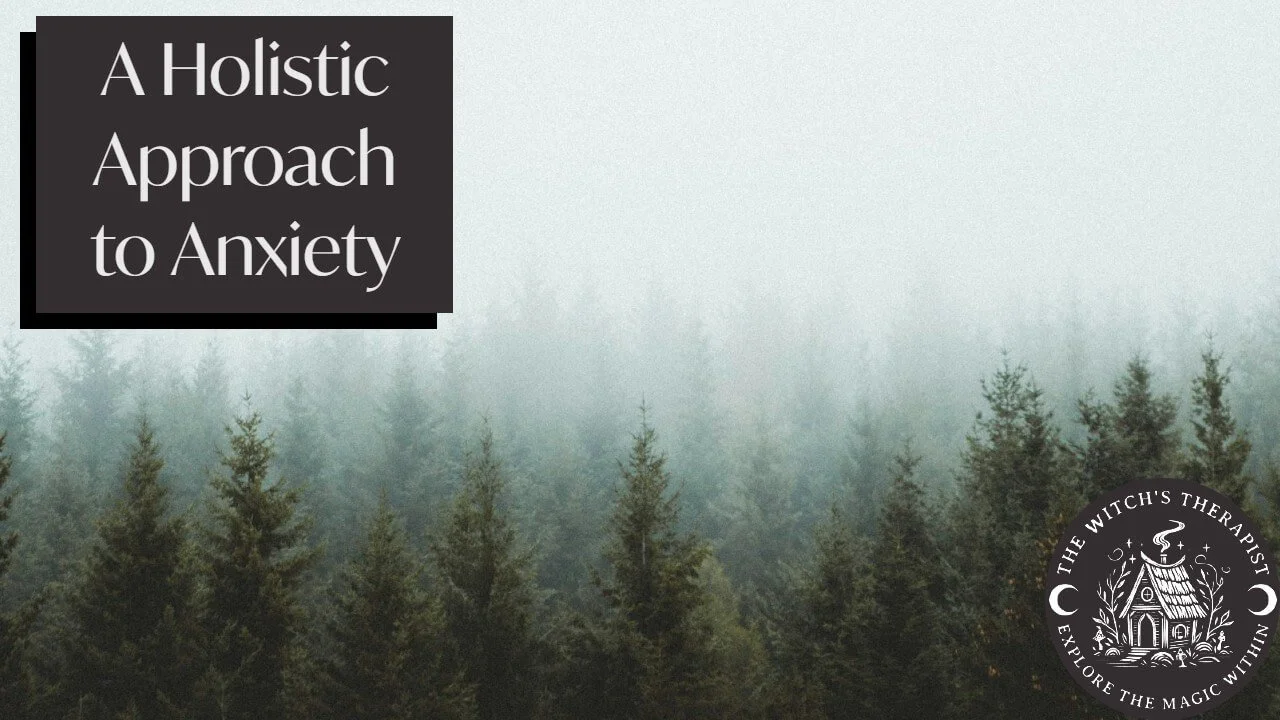A Holistic Approach to Anxiety
Anxiety can sneak into our lives quietly, like a hum beneath the noise of daily living.
At first, it may manifest itself as a restless night or a lingering feeling of unease.
But over time, it can grow into a constant companion.
It can shape the way we think, feel, and move through the world.
Of course, anxiety is a human emotion, like any other.
Like all emotions, it serves a useful purpose.
One can’t be rid of anxiety entirely, and in fact we don’t really want to.
Anxiety about an upcoming event can remind us that we need to prepare for it, for example.
This is a good thing.
But this type of anxiety is situational.
We can tie it to a specific event, and when that event passes the anxiety generally does too.
But what happens when you feel anxiety without any specific thing to tie it to?
That’s a different story.
In our modern world, where the pace is unrelenting and the demands are endless, anxiety can feel like an unwelcome companion that refuses to leave.
Yet within this challenge is also an invitation.
Anxiety can call us to slow down, to reconnect, and to seek balance in ways that go beyond quick fixes.
At The Witch’s Therapist, we’re a London Ontario spiritual therapist collective.
Our therapists recognize that healing anxiety requires more than just symptom management.
It asks us to honour the whole self, while exploring the deeper patterns that may be fuelling our discomfort.
By turning toward anxiety with curiosity and compassion, we can begin to transform it into an opportunity for growth and self-understanding.
Here at the clinic, we maintain a blog about therapy and spirituality.
This week’s article is on a holistic approach to anxiety, and on how holistic anxiety therapy can help.
Let’s take a closer look.
What Is Anxiety?
As we touched on a moment ago, anxiety is an emotion.
Along with joy, sadness, depression, happiness, anger, and many others, anxiety is a normal part of human emotional life.
It’s closely related with fear, but they are distinct from each other.
Fear is generally associated with a known threat.
From a prehistoric perspective, our ancestors might have felt fear upon sight of a sabretooth tiger.
On the other hand, anxiety is related to a lesser understood threat.
Those same ancestors, for example, might have felt anxiety while out foraging, without fully knowing why.
These two emotions are often difficult for us to differentiate.
They can feel similarly, and often occur together.
Emotionally, anxiety can show up as a persistent fear, worry, or dread.
It may be tied to specific situations, or it may hover in the background with no clear cause.
Anxiety is often felt in the body.
If you feel anxiety, you may notice the following:
- Rapid heartbeat
- Shallow breathing
- Upset stomach
- Muscle tension
- Restlessness
RELATED: Why Does My Body Feel Tense All the Time?
When we feel anxiety, our nervous system shifts into “fight-or-flight” mode, ready to respond to danger.
This is true even when no actual threat is present.
For example, you’re likely to feel anxiety if you’re woken up at night to a crashing sound in your home.
The fact that it was just your cat being a doofus and knocking something over again doesn’t matter.
Your nervous system doesn’t know that.
But once you see your cat sitting proudly beside their latest handiwork, your nervous system is supposed to respond by calming you back down.
Spiritual Effects of Anxiety
Spiritually, anxiety can be experienced as disconnection.
We may feel cut off from our purpose, our intuition, or the natural rhythms of life.
This sense of separation can amplify feelings of unease and make us feel lost or unsupported.
This is particularly true for those who are marginalized by late capitalist culture.
Racialized individuals, for example, may feel a profound disconnect from their ancestral practices.
RELATED: London Ontario Therapy for Racial Trauma
It’s common for racialized individuals to also experience intergenerational trauma.
This is often a result of colonialism and its legacy of destruction of indigenous ways of life.
RELATED: Intergenerational Trauma Therapist in London Ontario
Those with disabilities and chronic illnesses may also feel the spiritual effects of anxiety.
The inability to access community events can feel isolating and stressful, especially when such events are related to one’s spiritual practices.
RELATED: Therapy for Living with Disabilities in London Ontario
However, one need not be marginalized to feel the spiritual effects of anxiety.
The realities of modern life can leave so many of us feeling disconnected from anything greater than ourselves.
The dominant narrative of late capitalist society is to seek fulfillment of all types – spiritual, emotional, physical - through the accumulation of material wealth.
This is fundamentally incompatible with true fulfillment for many of us.
How Can Alternative Therapy for Anxiety Help?
If you’re feeling a profound sense of anxiety while navigating the brutality of the modern world, you’re not alone.
Here at The Witch’s Therapist, we feel it too.
We’re here to help you through the process of exploring, understanding, and honouring your anxiety.
From there, we can recognize how to hold space for it while helping you find relief.
Let’s take a look at some of the therapeutic practices we offer here at The Witch’s Therapist that can help.
1. Art Therapy
Art therapy is a form of therapy that uses art to explore your thoughts, feelings, and beliefs that can lie beneath your anxiety.
This form of therapy is useful for exploring such feelings, particularly when you’re having difficulty putting such feelings into words.
But you don’t need to be an artist, or to have any artistic skills to explore art therapy.
This is because the goal isn’t to create a great work of art.
Rather, it’s to help you connect with your emotions in a way that can reveal some deeper truths.
Art therapy can be helpful for exploring feelings such as anxiety, depression, chronic stress and burnout, low self esteem, and more.
2. Somatic Therapy
Somatic therapy is a form of therapy that focuses on getting in touch with the inherent wisdom of our bodies.
Our bodies are affected by our emotions, and our emotions in turn are affected by our bodies.
For many, our response to feelings of anxiety, depression, or stress manifests itself as trying to think our way through it.
This can be helpful, to be sure, but not always.
In some cases, we end up in a cycle of constant worry, planning, and doing, with the goal of soothing these feelings.
But emotions grow when we don’t make space for them.
The act of pushing these feelings away – by distracting, dissociating, avoiding, etc. – causes these feelings to get bigger.
After all, they wish to be tended to, like a child.
When you ignore a child who wants attention, what do they do?
They usually get louder, bigger, more in your face.
They make themselves harder to ignore.
Somatic therapy offers different ways of listening to and being with these difficult emotions.
That allows them to be witnessed, and usually then resolve.
If you’re caught in a cycle of anxiety, somatic therapy can help.
Somatic therapy asks us to slow down, to breathe, and to listen without judgment.
By learning to listen to our bodies and attend to their needs, we can uncover deeper truths about our experiences and emotions.
It’s a powerful practice that can help you acknowledge, listen and understand your anxiety and provide you with the tools to soothe it.
3. Mindfulness Therapy
Mindfulness therapy is the practice of coming back to the present moment.
Anxiety often lives in the “what ifs” of the future, or the “should haves” of the past.
By returning to the here and now, we create space to observe our thoughts and surroundings without being swept away by them.
Meditation, whether silent, guided, or movement-based, can offer profound relief.
Even a few minutes of mindful breathing, body scanning, or visualization can shift the nervous system from fight-or-flight into a calmer, more grounded state.
Over time, these practices help train the mind to find greater peace in stillness or greater capacity to be with challenging emotions like anxiety.
This can provide relief from anxiety.
4. Other Therapeutic Approaches
Other therapeutic approaches to anxiety we offer here at The Witch’s Therapist include:
- Emotional freedom therapy (EFT)
- And others
Your therapist will work with you to understand the benefits of each of these therapeutic approaches.
From there, we can help you decide which would best suit your needs.
In some cases, your therapist may recommend a combination approach, where we explore more than one modality.
Book Your Appointment With The Witch’s Therapist Today
No single approach to anxiety works for everyone.
However, there are many practices that can help ease anxiety and bring us back into balance.
The goal is not to eliminate anxiety entirely but to learn how to soften its hold and move through life with greater ease and resilience.
Each part of our being can carry its own form of anxiety, and together they create the sensations we know so well.
The racing thoughts, the tight chest, the feeling that something is “off” or unsafe.
Recognizing anxiety in this holistic way allows us to address it from multiple angles.
Instead of trying to push it away or silence it, we can approach anxiety as an indicator that something within us is asking for care and attention.
At The Witch’s Therapist, we can help you explore that.
Book your FREE 15-minute intro session with The Witch’s Therapist today.
The Witch's Therapist
609 William St. #101
London, Ontario
Canada
N6B 3G1
1-226-977-1660
► London Ontario Holistic Psychotherapy
The Witch's Therapist is located in London, Ontario and offers holistic psychotherapy therapy throughout London and surrounding areas.
.

